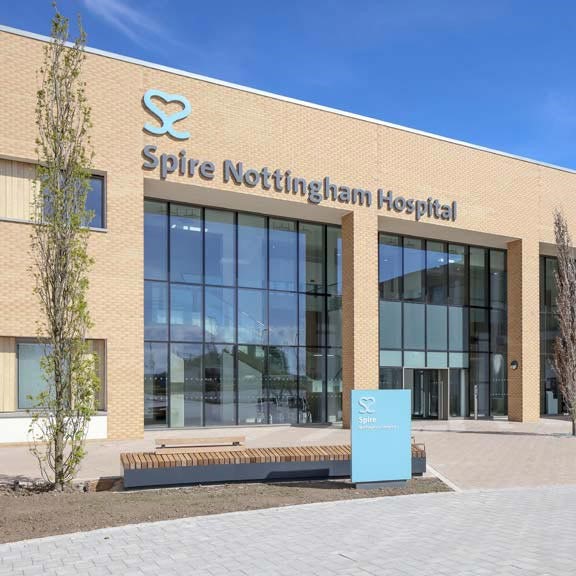Gastric sleeve surgery (sleeve gastrectomy)
Reduces feelings of hunger and capacity to eat by shrinking your stomach.
We offer this procedure for partial stomach removal to help weight loss if you’re severely overweight and diet and exercise haven’t worked.
Sometimes also called
- Sleeve gastrectomy
- Partial gastrectomy
- Bariatric surgery
- Weight loss surgery
At a glance
-
Typical hospital stay
2 nights -
Procedure duration
1-2 hours -
Type of anaesthetic
General -
Available to self-pay?
Yes -
Covered by health insurance?
Some insurers, by exception
Why Spire?
- Fast access to a wide range of treatments
- Consultants who are experts in their field
- Clear, simple pricing and flexible payment options
- 98% of our patients are likely to recommend us to their family and friends
What is gastric sleeve surgery?
It’s weight loss surgery to remove part of your stomach, leaving the left side in a long, sleeve-like shape.
This reduces your stomach size, limiting the amount you can eat. It also changes the way your hormones work, so you’ll feel full more quickly than before.
Other benefits are an improvement or a reduced risk of developing weight-related conditions such as type 2 diabetes and heart disease.
Who needs it?
If your body mass index (BMI) is 35 or more and you’ve been struggling to lose weight even while maintaining a healthy lifestyle, this could be an option for you.
You must also be fit for surgery and general anaesthetic to be considered for gastric sleeve surgery.
Sometimes, gastric sleeve surgery is carried out before you can have gastric bypass surgery. In this case, you’ll need to wait for up to 18 months after your gastric sleeve surgery before being assessed for the second operation. By that time, you should have lost a significant amount of weight.
Gastric sleeve surgery is different to a gastric bypass as a bypass involves creating a small pouch at the top of the stomach which is then connected to the small intestine, redirecting past (bypassing) the rest of the stomach.
Long term results
The surgery won’t stop you craving or eating unhealthy food, so you must be willing to make long-term lifestyle changes. To ensure your sleeve surgery will work long-term, you need to be committed to eating three low-sugar meals a day while avoiding snacks and sugary drinks. You should also avoid drinking liquids with your meals and increase the amount of exercise you do.
You should also consider other ways to relax or improve your mood, instead of relying on food.
Find your nearest Spire hospital
Almost all our hospitals offer private gastric sleeve surgery and have teams of bariatric (weight loss) consultants and surgeons who specialise in this procedure.

Events
Meet & Greet the Surgeon - Mr Gregory E. Ekatah
Meet & greet Mr Gregory E. Ekatah, Consultant Robotic Colorectal and General Surgeon.
Learn more
Free 10 minute mini appointments - Wave goodbye to hand, wrist & elbow pain
Join us with Mr Gunaratnam Shyamalan, Consultant Hand Surgeon, who specialises in hand, wrist and elbow conditions.
Learn more
Free 10 minute mini appointments - Hand, elbow & shoulder pain
Join us with Mr Tim McBride, Consultant Orthopaedic Surgeon, who specialises in hand, elbow, and shoulder conditions.
Learn more
How gastric sleeve surgery works
It’s an operation to remove one side of your stomach to help you lose weight. This works in two ways:
- It reduces your stomach size by around 75%, limiting the amount you can eat
- It removes the portion of your stomach mainly involved in releasing the hunger hormone ghrelin, so you should feel full much more quickly
The benefits are:
- You can expect to lose around 30-50% of your excess weight in the first 12 months after your operation, and over two thirds in total
- Improvements in any weight-related conditions that you might have such as type 2 diabetes, heart disease, osteoarthritis, obstructive sleep apnoea, high cholesterol, and polycystic ovaries
- You'll be more able to do physical activity which can lead to increased energy, fitness, strength, stamina, bone density, improved mood and self-confidence
- Improvements in fatigue and shortness of breath
"Every day I pinch myself because I cannot believe that I've actually lost the weight"
Imogen
Imogen underwent gastric sleeve surgery at Spire Gatwick Park Hospital.
View transcript of this video
♪ [music] ♪I was always bigger literally. I was born overweight and I was on a diet from about age of eight. I'd be weighed every week. I've seen doctors and dietitians and whatever I did, it just didn't really work. I was very sporty, always very healthy but I just couldn't lose weight biologically.
I guess it's probably the reason metabolically, it just didn't work. I had the surgery a year ago,10 stone down so far, another couple to go., I didn't know that I could be so happy. It's absolutely incredible, on top of the world. I'm absolutely... Every day I pinch myself because I cannot believe that I've actually lost the weight.
I cannot... Even now it's been a year and I'd say that every single day of the past 365 has been better than the last. It just keeps getting better and better and I'm living the life I always wanted. I have these experiences that I never dreamt that I... Like I went to New York, which, for me was... I never travelled. Never got on a plane because I was scared of the seat belt, so I went to New York.
I'm running a 10K and I'm just being sociable. I got a new job. I had a horrible job before and I was miserable and I'm now in a workplace where I'm happy and people are nice to me and it's just, every aspect of my life is just everything I ever dreamt it would be. I guess the thing for me is the fact that I went and I did this when I was 24 at the time, which is quite young, it was quite young to make that decision but I had spent my whole life around weight loss so I was aware of surgical options but for me, it was just taking that plunge.
But I'm so glad I actually did it when I was younger because it now means that I've got the rest of my life to enjoy being normal which is just the ultimate goal. That's all I ever wanted, was just to be normal and live a normal life and do the things that everyone else did that I couldn't do. It all fell into place really well I've now got this life I always dreamt of and I'm just so glad I didn't waste a second or another year or another 10 years, 20 years, 30 years, however long you do.
I'm glad I just took the plunge and I did it because it was the right time. ♪ [music] ♪
What to expect during gastric sleeve surgery
Who will be involved?
As well as your bariatric surgeon, you’ll also be seen by a:
- Dietitian – to talk to you about your diet
- Clinical Nurse Specialist
- Anaesthetist – to administer anaesthetic during the operation
You may be seen by a psychologist as well, who will talk to you about the emotional aspects of your gastric sleeve surgery and understand how we can support you through this process.
Before surgery
You’ll be assessed to check that you’re fit for the operation. This may include blood tests, X-rays and scans, as well as an explanation of the surgery and long-term outlook.
You may need to lose weight and follow a calorie-controlled diet, low in carbohydrates and fats, to reduce the size of your liver. This is important for gastric sleeve surgery as your liver will have to be moved out of the way so your surgeon can access the stomach. If the liver is smaller, the operation will be easier and safer.
During surgery
Gastric sleeve surgery is usually done by laparoscopic (keyhole) surgery. This has a faster recovery time than traditional open surgery. As the resulting stomach restricts the amount of food and drink you can hold, it’s known as a restrictive operation. The surgery is carried out under general anaesthetic so you’ll be asleep.
During the operation your surgeon will:
- Make small incisions and insert a telescopic instrument with a camera on the end – called a laparoscope
- Temporarily inflate your abdomen with carbon dioxide gas – this will create more space for the surgeon to work within
- Divide and seal any blood vessels supplying the part of your stomach to be removed
- Surgically remove around 75% of your stomach, leaving the remainder in a sleeve-like shape
- Leave in place the valve that releases food into your small intestine so your digestive system isn’t changed
- Close your incisions
If your surgeon thinks keyhole surgery isn’t suitable for you, they may suggest open surgery, which involves making one single, larger cut.
How long does gastric sleeve surgery take?
Between one and two hours.
Pain after gastric sleeve surgery
It’s normal to experience some pain or discomfort after gastric sleeve surgery, but your healthcare team will make sure you have appropriate pain relief medication.
Your hospital stay
You’ll stay in hospital for around two nights – but please note the length of stay can vary. After your surgery, you will be given compression stockings or blood-thinning medication to reduce your risk of blood clots which can lead to complications such as DVT (deep vein thrombosis) and pulmonary embolisms. You may also be transferred to the High Dependency Unit where nursing staff can monitor your blood pressure and other vital measurements throughout the night.
You’ll then be transferred to the ward and stay until you have completed your normal swallow test and started your diet plan, this can be a further one to two days – but please note a swallow test may not always be required.
Q & A
Simon Monkhouse, Consultant Upper GI and Bariatric Surgeon
Talking about gastric sleeve surgery
View transcript of this video
What is gastric sleeve surgery?
A sleeve gastrectomy is the most popular weight loss surgery procedure worldwide and it is a keyhole procedure that is done where the bulk of the stomach is removed, so 80% of your baggy stomach would be converted into 20% of a long, thin tube of the stomach.
How does it work and who is suitable for it?
It’s very effective because it reduces what you can eat but also there is a hormonal aspect to it which affects your metabolism. So if your BMI is 35 or above and you have a weight-related problem such as high blood pressure, diabetes, breathing issues, then you are eligible potentially for this procedure.
What happens before the procedure?
Once you have had your consultation and you are deemed to be suitable, you would meet the multidisciplinary team and that’s a really big part of what we do at Spire. You’ll see the dietitian, the psychologist, the specialist nurse and you’ll also have a pre-operative camera test, an endoscopy, in order to check your stomach out.
How long does gastric sleeve surgery take?
The operation itself would take about an hour to an hour and a half to do, and we would expect you to be in hospital for one to two days.
Is gastric sleeve surgery successful?
A good outcome from this operation is 80% of your excess weight gone at one year and I would expect most people to achieve that.
Recovering from gastric sleeve surgery
Recovery time
You can usually leave hospital two days after your surgery and it’s normal to feel very tired at first.
You may be able to return to work as soon as one week after your surgery but this is dependent on how strenuous your job is, most people get back to work after three weeks. You can expect to drive within four weeks but you should check with your doctor and motor insurance company first.
You should feel comfortable doing most everyday activities within four to six weeks. For three to six months afterwards, you may also get symptoms due to rapid weight loss, such as:
- Aching
- Dry skin
- Feeling cold
- Mood changes
- Thinning hair
- Tiredness
After two years, most of your weight loss will have happened.
Aftercare and ongoing treatment
Your healthcare team will explain what you need to do during your recovery. This will include:
- Pain relief
- A review of any medicines you’re taking for weight-related conditions, such as diabetes or high blood pressure
- A carefully controlled diet plan for the first four to six weeks, moving from liquids to pureed, soft then solid foods, plus advice on eating and portion sizes
- An exercise plan to help speed up your weight loss and improve your fitness
- Blood tests to check if you need extra vitamin and mineral supplements
Your lifestyle after treatment
Even though you won’t be able to eat as much as before your surgery, it’s important to follow a healthy diet and lifestyle and perhaps change your eating habits. This way you’ll maximise your weight loss and reduce your risk of weight-related diseases. Our dietitians will help you.
You should drink plenty of fluids throughout the day to avoid dehydration and constipation. Chewing your food thoroughly and not drinking and eating at the same time will reduce your risk of dumping syndrome. This is a collection of uncomfortable symptoms that occur when food enters the small intestine too quickly, including nausea, vomiting, dizziness, sweating and diarrhoea.
Gastric sleeve surgery will not change how well the stomach can absorb food, but it can change the absorption of iron and vitamin B12. You may need to be on some supplements long-term.
You should avoid getting pregnant for the first 18 months after gastric sleeve surgery so your weight can stabilise.
To maintain the benefits of your weight loss surgery, you’ll need regular check-ups for the rest of your life. These will become less often as time goes on.
Risks and complications of gastric sleeve surgery
Most people have gastric sleeve surgery without complications, but all surgery carries some risks. Your consultant will explain them to you before you go ahead.
Gastric sleeve surgery complications can include:
- Blood clots
- Infection
- Internal bleeding
- Leaking from where the stomach has been closed
- Acid reflux – when stomach acid leaks back up into your oesophagus (the tube that connects your mouth and stomach)
- Nausea and vomiting, which usually gets better over time
- Nutritional deficiencies
- Folds of skin due to rapid weight loss
- Stomach ulcers
- Stricture – where the connection between the stomach and intestine narrows
- Adhesion – where scar tissue forms between two or more organs and it results in them sticking together
- Deep vein thrombosis (DVT) and pulmonary embolism
- Infertility
- Changes in mental health such as depression and maladaptive eating
- Weight gain or recurrence of obesity-related illnesses
Anaesthetic complications can include:
- Unexpected reaction to the anaesthetic
- Chest infections
Treatment and recovery timeline
Although everyone’s different, here’s a typical recovery timeline for gastric sleeve surgery:

Day 2
2 years
2 days
Able to leave hospital
1-3 weeks
Return to work, depending on your job
4 weeks
May be able to drive (check with your car insurance company)
4-6 weeks
Follow a controlled, monitored diet
3-6 months
Less symptoms of rapid weight loss
2 years
Most weight loss will have happened
-
2 days
Able to leave hospital
-
1-3 weeks
Return to work, depending on your job
-
4 weeks
May be able to drive (check with your car insurance company)
-
4-6 weeks
Follow a controlled, monitored diet
-
3-6 months
Less symptoms of rapid weight loss
-
2 years
Most weight loss will have happened
Frequently asked questions
How do you qualify for gastric sleeve surgery?
To receive gastric sleeve surgery, you must have either a body mass index (BMI) of 40 or higher, or 35 or above and another medical condition that would be helped by weight loss. You will also need to have previously tried other weight-loss techniques, such as maintaining a healthy lifestyle, but struggled to lose weight. Additionally, you'll need to be fit for surgery and general anaesthetic.
How much do you have to weigh to get gastric sleeve?
There is no set weight you have to be to be suitable for gastric sleeve surgery, but your body mass index (BMI) must be over 35.
To calculate BMI: Weight (kg) ÷ Height (m)2
How long does it take to recover from gastric sleeve surgery?
You should be able to return to work within one to three weeks of surgery, and most activities between four to six weeks. You may experience some symptoms of rapid weight loss three to six months after your procedure, and most of the weight loss will have happened within two years.
What can I eat after my gastric sleeve surgery?
You won’t be able to eat after your procedure until you’ve passed the normal swallowing test. Then you’ll be allowed to eat some soft foods before a healthy balanced diet. Our dietitians will support you through this.
What is the average weight loss with a gastric sleeve?
On average, people lose 65% of their excess weight from gastric sleeve surgery.
Do you lose more weight with gastric bypass or gastric sleeve?
After gastric sleeve surgery, your stomach will be reduced from 1500ml to 200ml. A gastric bypass procedure reduces the size of the stomach to 30ml. Because of this, there is potential to lose more weight with a gastric bypass, however, how much weight you lose is ultimately down to how you change your lifestyle after your surgery and not the procedure itself.
Is a gastric sleeve permanent?
Gastric sleeve surgery is generally non-reversible. However, if you do not adopt a permanent healthy lifestyle after the procedure, there is a risk of you reversing your weight loss.
What happens if you eat food too soon after gastric sleeve?
Eating solid foods too soon after your gastric sleeve surgery can create pressure on your stomach pouch and stretch it, this may lead to vomiting and discomfort. To avoid this, you should follow the advice that will be given to you by your dietitian.
Can you drink alcohol after gastric sleeve?
You can drink alcohol after your procedure but the rate at which it is absorbed may have changed. Remember, you will need to adopt a healthy lifestyle after your procedure to successfully lose weight, so keep this into consideration when drinking alcohol.
Can you gain the weight back after gastric sleeve?
There is a risk of weight gain and recurrence of obesity-related conditions following gastric sleeve surgery. But should you follow advice from the dietitian and continue to exercise then this should not happen.
How long do you stay in hospital after gastric sleeve?
You may be in hospital for up to two nights following your surgery.
The treatment described on this page may be adapted to meet your individual needs, so it's important to follow your healthcare professional's advice and raise any questions that you may have with them.


